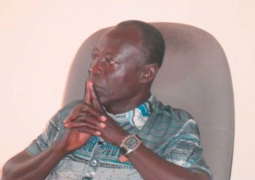Stakeholders from government agencies, the private sector and the civil society on 22 August 2013 concluded a two-day strategic planning and target setting for reviewing and planning of The Gambia’s National Biodiversity Strategy and Action Plan (NBSAP) for effective implementation of target settings.
The stocktaking forum was a central component of the NBSAP Revision Project currently under implementation by the Department of Parks and Wildlife Management held at the Atlantic Hotel in Banjul.
According to organizers, the NBSAP was developed in 1998, which encompasses a comprehensive framework for effective conservation of the fast declining biodiversity heritage of the country.
Speaking at the opening ceremony, Mustapha Darboe, permanent secretary at the Ministry of the Environment, Parks and Wildlife, stated that The Gambia Government signed the Convention on Biological Diversity in 1994 and developed her first NBSAP in 1998.
The government has always put environment conservation and protection on top of its agenda, he added.
According to him, after 15 years of implementation of the NBSAP projects, reports have shown that the need to revise and review the NBSAP to mainstream the country’s blueprints such as PAGE, MDG, Vision 2020 has become very important.
He said: “During the course of the revision of Gambia’s NBSAP, there was an absolute need to blend it into the current decentralised system that would enhance mainstreaming issues such as promoting conservation and sustainable use of biodiversity, and addressing issues that accelerates land degradation and biodiversity loss.
“We are expecting that the new NBSAP will pave a new direction for biodiversity planning and NBSAP implementation in The Gambia,” he emphasised.
Salimina Jobe, NBSAP project coordinator, stated that NBSAP review project is a GEF-funded small-scale project implemented by UNEP aimed at ensuring the effective mainstreaming of biodiversity conservation issue into sectoral policies of stakeholder institutions of member states including The Gambia.
National Biodiversity Strategies and Action Plans (NBSAPs) are the principal instruments for implementing the convention at the national level that requires countries to prepare a national biodiversity strategy (or equivalent instrument) and to ensure that the strategy is mainstreamed into the planning and activities of all those sectors whose activities can have an impact on biodiversity.
Dr Lewis Saiwana, Technical Assistant to the Department of Parks and Wildlife Management, said the convention requires countries to prepare a national biodiversity strategy or equivalent instrument and to ensure the strategy is mainstreamed into the planning and activities of all those sectors whose activities can have positive and negative impacts on biodiversity.
The Convention on Biological Diversity is a framework for national action for the conservation of biodiversity, the sustainable use of its components and the equitable sharing of benefits arising out of the utilization of genetic resources.
For his part, the National Focal Point for Protected Areas, Kawsu Jammeh, who moderated the session, stated that the principal objectives of the convergence are among others to ensure a thorough understanding of the full process of developing a national biodiversity action plan, initiate stocking, establish a steering committee as well as discuss and process a draft procurement plan.
Read Other Articles In Article (Archive)


